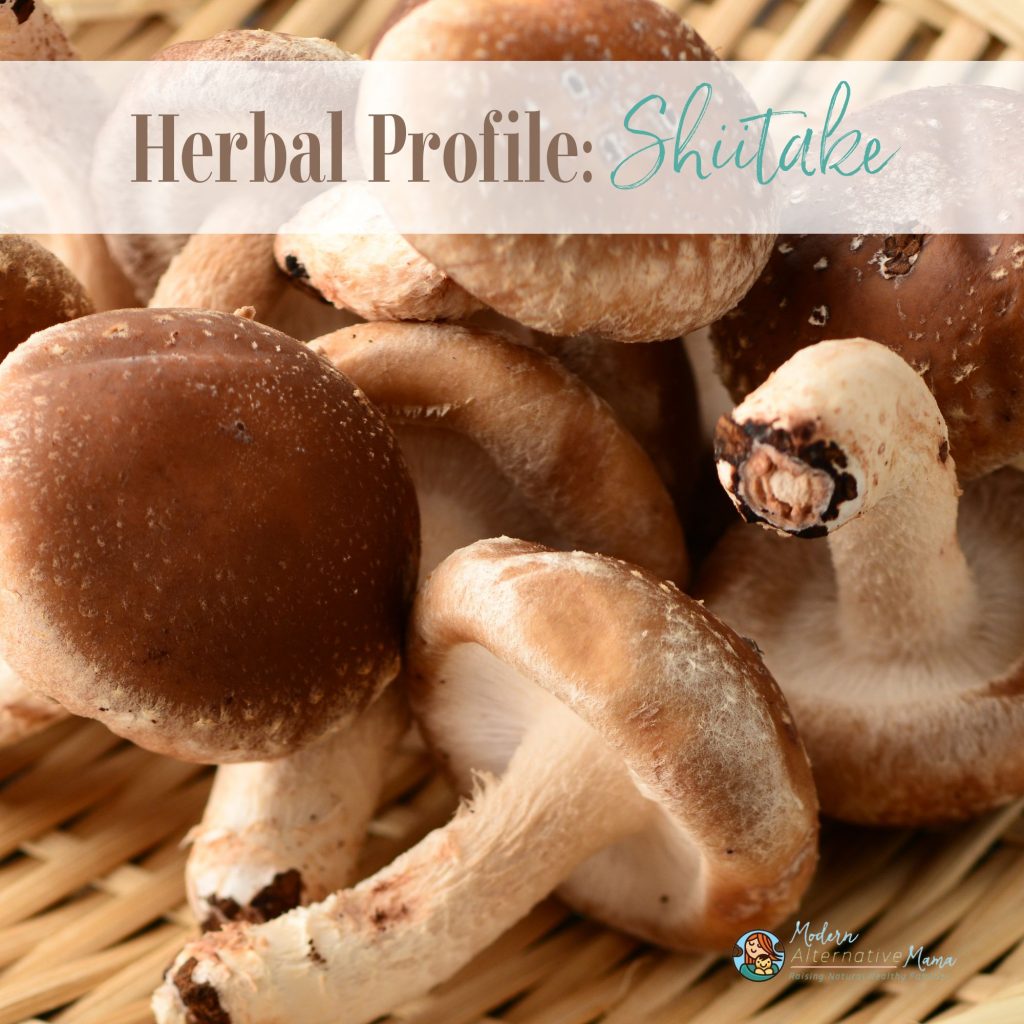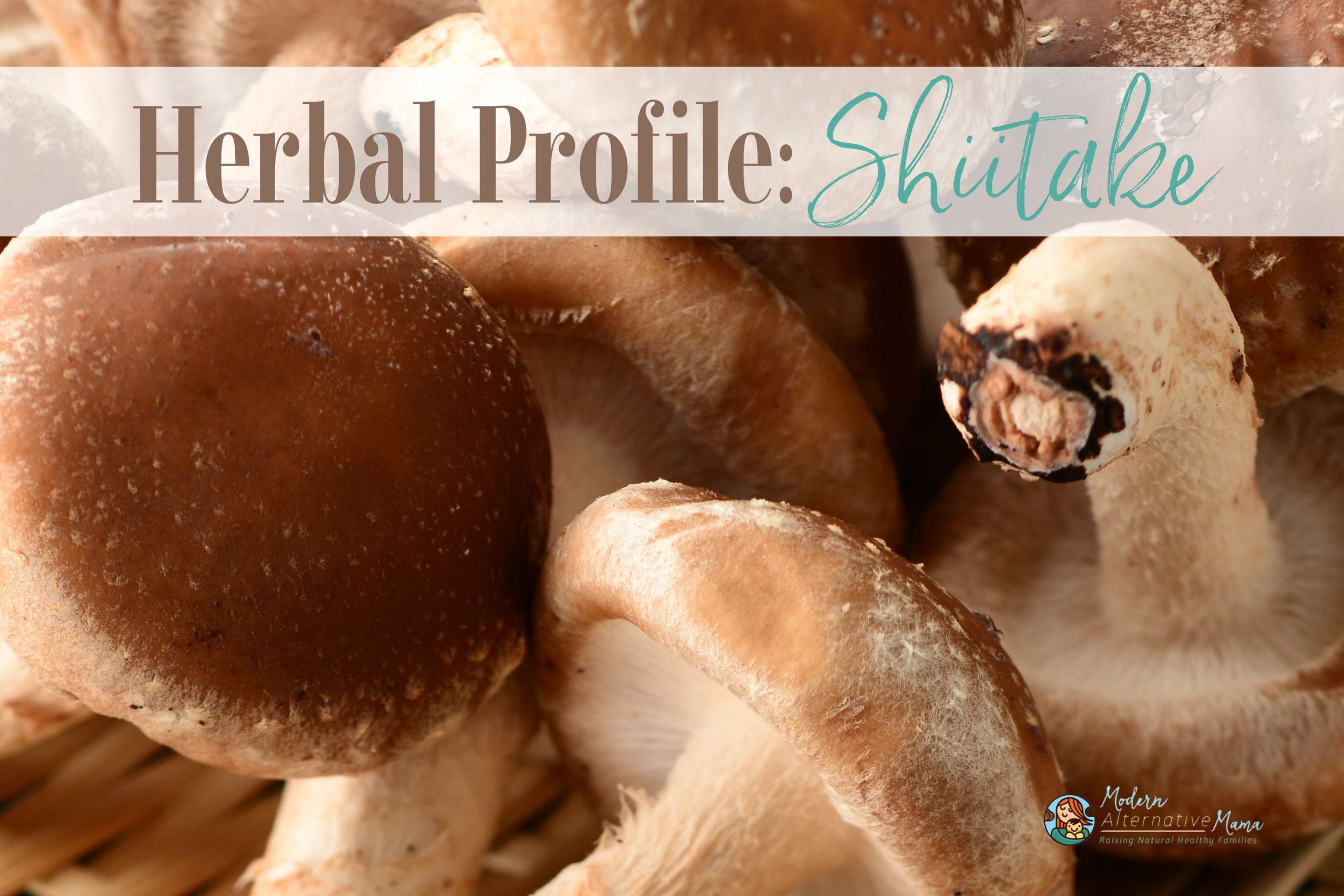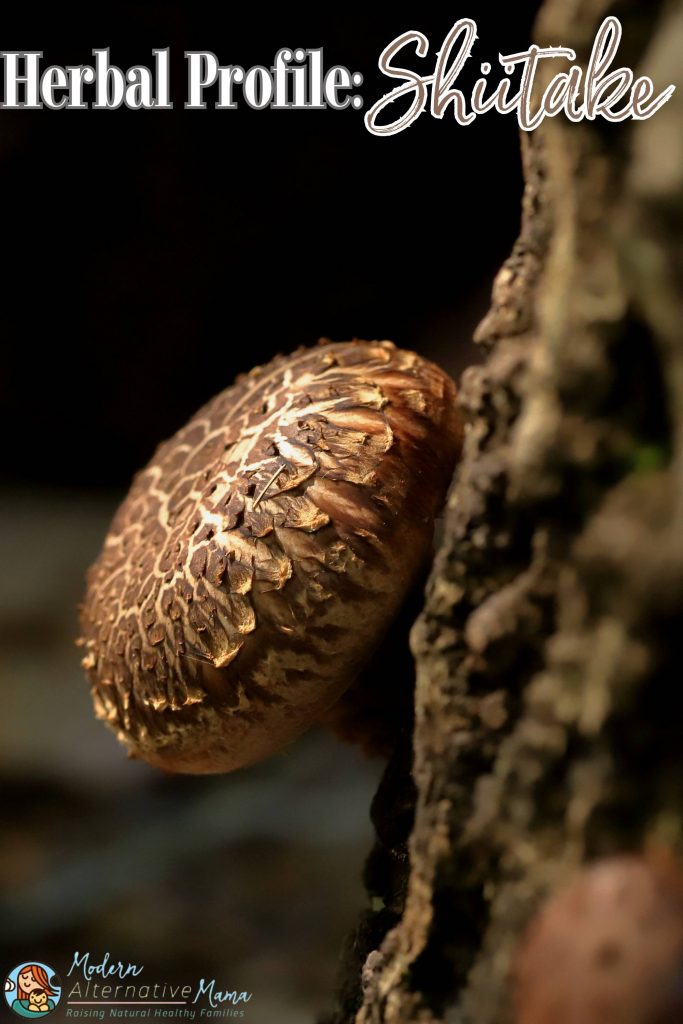What is Shiitake
Shiitake, also referred to by its botanical name Lentinula edodes, is a common mushroom native to East Asia (1). Similarly to reishi and lion’s mane mushrooms, shiitake is saprotrophic, meaning it feeds off dead organic matter, such as a dead or dying tree, old stumps, or logs, which is where it grows (2).
Shiitake mushrooms have a tannish/brown umbrella-shaped cap that grows between two to six inches in diameter. The edges of the shiitake mushroom’s cap roll down and inward with a whitish/cream-colored gill-like underside. Shiitake mushrooms can grow upward of four inches long (3). Shiitake mushrooms should be harvested when the cap is 50 to 75% opened. If you wait until the cap is 100% opened, you may experience a delay before the next flush, pest problems, and a reduced shelf life (4).
If you want to learn more about mushrooms, check out Earthley’s unit study, Learn to Homestead: Wild Mushrooms.
Health Benefits of Shiitake
Although shiitake has grown in popularity for culinary preparations, it’s also used for herbal remedies due to its well-documented health benefits, including:
Rich in Nutrients
The human body needs nutrients to flourish. Without vital vitamins and minerals, the human body won’t function properly. Shiitake is rich in protein, fiber, magnesium, phosphorus, potassium, biotin, and trace amounts of iron, zinc, selenium, and vitamin D (5).
Antimicrobial Properties
An antimicrobial property is when a substance, or in this case, an herb, can kill or suppress the spread of microorganisms such as bacteria, viruses, protozoans, and fungi (6). One study demonstrated considerable activity against all bacteria and fungi tested (7). In other studies, shiitake’s compounds contained antibacterial, antiviral, and antifungal properties (8,9).
Antioxidant Properties
Antioxidants can help fight damage from harmful free radicals. The buildup of free radicals has been linked to chronic diseases, such as cancer and heart disease (10). Studies have found shiitake exhibits high antioxidant properties (11). One study found shiitake extract has moderate antioxidant activity measured via 2,2-Diphenyl-1-picrylhydrazyl (DPPH) and oxygen radical absorbance capacity (ORAC) tests (12). Another study demonstrated shiitake’s antioxidant activity by regulating nitric oxide concentration and thiol redox status (13).
May Support the Immune System
The immune system protects the body from outside invaders, including bacteria, viruses, fungi, and toxins (14). When you support your immune system, you support your body’s ability to fight sickness and reduce the risk of serious illness. In animal studies, shiitake helped reverse age-related impaired immunity in mice (15). In human studies, shiitake improved immune markers after taking two dried shiitake mushrooms daily for a month (16).
Anti-Inflammatory Properties
Although inflammation is a natural bodily response, chronic inflammation can lead to detrimental health effects. Chronic inflammation has been linked with many diseases, such as type 2 diabetes, asthma, and certain cancers (17). Thankfully, shiitake may help reduce inflammation. The previously mentioned human study that improved immune markers also noted decreased inflammation levels (16). Another study found that consuming shiitake mushrooms modestly affected inflammatory responses (18).
May Promote Heart Health
Unfortunately, heart disease is the world’s number one cause of death (19). Due to the incredibly complex determinants of heart disease and various possible contributions, it’s hard to pinpoint an exact way to prevent it. Still, you can at least take steps to lower your overall risk. That’s where shiitake may come in.
Shiitake’s compounds, like eritadenine, sterols, and beta-glucans, can promote heart health (20,21,22). In animal studies, shiitake powder decreased blood pressure levels in rats with hypertension (23). In another animal study, rats fed a high-fat diet developed less fat in their livers, less plaque on their artery walls, and lower cholesterol levels when given shiitake mushrooms (24).
May Promote Bone Health
Low bone mass affects an estimated 43 million older adults in the United States, leading to osteoporosis and an increased risk of bone fractures and breaks (25). Thankfully, shiitake can help reduce the risk of bone loss, thanks to its vitamin D content. In an animal study, mice fed low calcium and vitamin D levels developed osteoporosis, while rats given calcium and UV-enhanced shiitake (for vitamin D) had higher bone density levels (26).
Anticancer Properties
Statistics say that 158.3 of every 100,000 individuals will die from cancer, but what if they didn’t have to (27)? Several studies indicate that shiitake’s cancer-fighting properties come from its polysaccharides lentinan compound (28,29). Polysaccharides lentinan helps the immune system fight tumors and has demonstrated the ability to inhibit the growth and spread of leukemia cells (30,31,32). In studies, an injectable version of polysaccharides lentinan has been used alongside chemotherapy and other cancer treatments to improve immune function and quality of life in gastric cancer patients (33,34).
Safety Concerns
According to mainstream sources, shiitake mushroom is likely safe when cooked and eaten in food amounts. They claim it’s possibly unsafe when uncooked or used in larger amounts like medicine. They warn shiitake can cause stomach discomfort, blood abnormalities, skin swelling, photosensitivity, skin allergies, and breathing problems in some people. They also claim there isn’t enough reliable information to know if shiitake is safe while pregnant and breastfeeding.
The mainstream also warns that shiitake might cause the immune system to become more active and increase symptoms of autoimmune diseases. They recommend avoiding shiitake if you have an autoimmune condition like multiple sclerosis (MS), systemic lupus erythematosus (SLE), rheumatoid arthritis (RA), or other conditions. They also recommend avoiding shiitake if you have a blood disorder called hypereosinophilic syndrome (35).
Although I couldn’t find any herbalists who spoke on the safety profile of shiitake, I’d like to note that shiitake is a mushroom, a food that can be purchased in many grocery stores. To claim a mushroom with as many documented health benefits as shiitake is potentially unsafe is unrealistic. Shiitake is used as a meat substitute throughout the plant-based community, and it is completely safe to consume, even while pregnant and breastfeeding. There is no evidence of the autoimmune and blood disorder claims. Of course, not every herb is right for every person, so discontinue usage if you find shiitake isn’t the right fit for you.
How to Use Shiitake
You can find shiitake as whole mushrooms and in pills, powders, extracts, or tinctures. Tinctures always contain the most concentrated amount of herbs. Teas and soups are also options, especially when following Ayurvedic medicine recipes. If you’re a DIY person, some great starter recipes are:
- How to Make an Alcohol Extraction (With Almost Any Herb) – to make a shiitake tincture
- How to Make a Glycerin Extraction (With Almost Any Herb) – to make an alcohol-free shiitake tincture
Follow the recommendations of any supplement; some of my recommendations include:
- Earthley’s 5-Mushroom Super Blend Capsules support the brain and immune system. Mushrooms have been shown to enhance cognitive functions like learning and memory while also aiding in support against symptoms of depression, anxiety, stress, neurological disorders, and more. Our chosen superstar mushrooms are high in anti-inflammatory and antioxidant properties to improve immunity and overall health.
- Earthley’s Immunity Soup Blend helps support your immune system while enjoying a yummy soup, stock, or whatever meal you’d like! Simply simmer, strain, and add to your recipe for added flavor and nutrients.
- Earthley’s Mushroom Tincture is a great way to get the benefits of medicinal mushrooms in a highly bioavailable liquid form. We use only the whole fruiting bodies to create our tincture, not mycelium (which has fewer benefits). Experience improved mental health and clarity, immune support, lowered inflammation, and more!
Disclaimer: This post is not intended as medical advice. These statements have not been evaluated by the FDA, and nothing in this post is intended to diagnose, treat, or cure anything. If you have questions, please do your own research or seek advice from a health professional.








